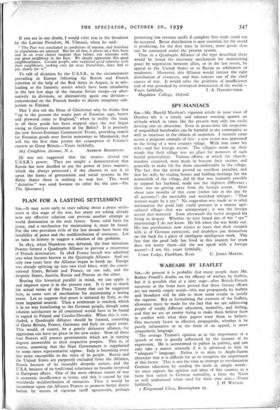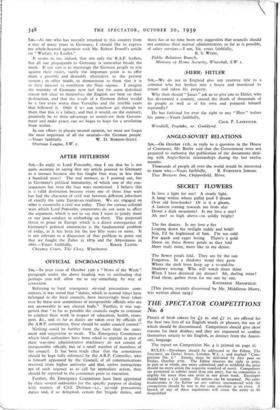WARFARE BY LEAFLET
Sra,—At present it is probable that many people share Mr. Robert Powell's doubts on the efficacy of warfare by leaflets, but it is possible that at a later stage—after British-French successes at the front have proved that these literary efforts are not merely empty words—this war propaganda by leaflets and broadcast will be able to show some results to justify the expense. But in formulating the contents of the leaflets, allowance must be made for the fact that we are addressing people of totally different education, mentality, and feeling, and that we are an enemy trying to make them believe facts in conflict with what their papers want them to believe. One necessary factor in effective propaganda, whether it be purely informative or in the form of an appeal, is more sympathetic language.
The average Teuton's opinion as to the importance of a speech or text is greatly influenced by the manner of its expression. He is accustomed to pathos in politics, and can only take a matter seriously if it is advanced to him in " adequate " language. Pathos is so alien to Anglo-Saxon character that it is difficult for us to recognise the importance of this factor. This is not the time to attempt to revolutionise German education by sending the truth in simple words: we must express the opinion and ideas of this country in a form best suited to German mentality, a form the Nazis so well understand when used for their own aims.—Yours
Si,—As one who has recently returned to this country from a stay of many years in Germany, I should like to express my whole-hearted agreement with Mr. Robert Powell's article on "Warfare by Leaflet."
It seems to me, indeed, that not only the R.A.F. leaflets, but all our propaganda to Germany is somewhat beside the mark. If our aim is to encourage the German people to rise against their rulers, surely the important point is to offer them a possible and desirable alternative to the present system ; in other words, to demonstrate to them that it is to their interest to overthrow the Nazi regime. I imagine the majority of Germans now feel that for some diabolical reason not clear to themselves the English are bent on their destruction, and that the result of a German defeat would be a fate even worse than Versailles and the terrible years that followed it. Only if we can somehow get through to them that this is a fallacy, and that it would, on the contrary, positively be to their advantage to overthrow their Govern- ment and make peace, can we begin to hope for a revolution from within.
In our efforts to placate neutral opinion, we must not forget the most important of all the neutrals—the German people.













































 Previous page
Previous page